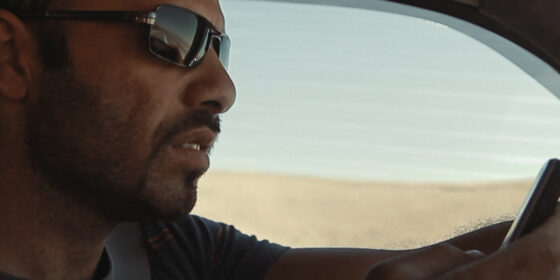TIFF 2021 | The Devil’s Drivers (Mohammed Abugeth & Daniel Carsenty, Qatar/France/Lebanon/Germany)

By Katherine Connell
Car chases, the customary crescendo of the action genre, are a tense everyday reality for the subjects of The Devil’s Drivers, Mohammed Abugeth and Daniel Carsenty’s documentary that follows Palestinian drivers who smuggle workers living in the West Bank into Israel. Plumes of orange dirt trail behind vehicles navigating desert roads at a clip while the filmmakers’ passenger-seat POV intimately captures this cadre of drivers who use walkie talkies and cellphones to evade Israeli surveillance during these complex operations that can (and do) result in imprisonment. The workers making the trip express that they have no choice: backed into the double bind where the prospective pay—a small improvement over what they can earn at home—represents an opportunity to continue feeding their families and sending their children to school.
Shot over eight years, The Devil’s Drivers covers considerable ground, using animated sequences to contextualize its subject within the broader history of the Israeli occupation and the struggle for Palestinian liberation. Among the film’s many painful ironies is that the smuggled workers entering Israel often work in construction (for terrible pay and under disgraceful conditions), their labour reinforcing the structures of subjugation and colonial encroachment while the threat of demolition looms over their own homes. (That same ironic logic applies to the film itself, as the footage shot by Abugeth and Carsenty could potentially endanger their subjects by the very act of capturing their images: the drivers frequently ask the directors to lower their camera, or turn it off completely.)
In addition to tracking the often frightening border crossings, Abugeth and Carsenty are fully invested in their subjects’ communities, which are depicted in warm, extended scenes of domestic life. This dichotomy is best summarized by the film’s principal subject, Hamouda, who upon returning from a smuggling trip remarks: “When I come home safely in the afternoon, I start a new life.” That this “new life” refers only to a temporary respite prompts the viewer to consider how urgent it is to fight for its permanence.
Katherine Connell

